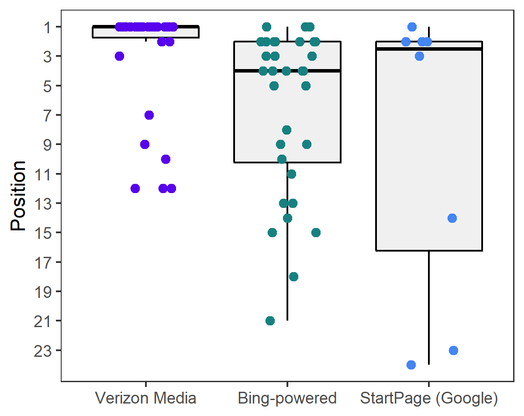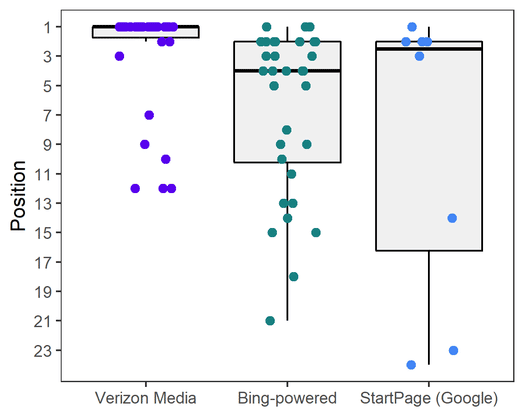One of the persistent complaints of Google critics is that the company favors its “own properties” in search results. This has been the subject of antitrust investigations in the U.S. and Europe. However, a recent study conducted by developer Daniel Aleksandersen finds that the three search engines owned and operated by Verizon Media (Yahoo, AOL, OneSearch) systematically favor Verizon-owned media properties in results.
Search bias evidence. Aleksandersen’s study is small but it produced evidence of “search bias” in the ranking of organic results. All of Verizon’s engines are powered by Bing. He tested the same queries across Verizon search sites and third-party sites (FindX, and Lilo) also powered by Bing results, as well as Bing itself. He also looked at Google-powered Startpage.
Distribution of results across Bing-powered sites. Below is the distribution of results on three of those engines: Verizon-owned, Bing-powered third-party sites and Google-powered.
Comparative rankings for Verizon-owned media properties

Aleksandersen’s writes that “Verizon Media-properties [i.e., Engadget, HuffPost and TechCrunch] had a median search result position of 1 and an average position of 2.8 in Verizon Media-owned search engines.” In the left column in the chart, Verizon-owned properties are clustered at the top of the organic listings.
However, he says, that the “three Bing-powered control search engines rank Verizon Media-properties consistently lower with a median position of 4 and an average of 9.4.” (The Google-powered results also show a different distribution, albeit somewhat closer to the Verizon search sites.)
The logic is that if all six tested engines are “powered by Bing,” they should show identical or a very similar distribution of organic results. But they do not, indicating bias to Aleksandersen.
Why we care. So is all this unethical? The consensus would probably be yes. Is it illegal? Unlikely.
There are at least two appellate court cases, Search King, Inc. v. Google Technology, Inc. (2003) and Langdon v. Google, Inc. (2007), establishing the proposition that search results are protected editorial speech under the First Amendment of the U.S. Constitution. However, the U.S. Supreme Court has not ruled on the question.
Consequently, Verizon is probably protected under that principle. In addition, the combined market share of its engines is now very small, less than 5% in the U.S., and thus unlikely to get regulatory attention. But the still-millions of queries are probably meaningful for those media properties and their advertisers.
The post Yahoo and other Verizon-owned search sites favor Verizon media properties [Study] appeared first on Search Engine Land.
Source: IAB

